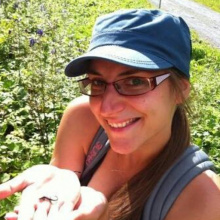Nutritional resilience in bumblebees

Maryse vanderplanck
CEFE, Univ Montpellier, CNRS, EPHE, IRD, 34293 Montpellier, France
Laboratory of Zoology, Institute for Biosciences, Univ Mons, 7000 Mons, Belgique
Link to seminar: https://umontpellier-fr.zoom.us/webinar/register/WN_FUK4GOE0R1-OUHwqhMuPMw
Summary
It is common knowledge that bees predominantly collect pollen to satisfy their nutritional and physio-logical requirements, pollen being essential for reproduction, individual health and larval develop-ment. Pollen is a complex chemical mixture that contains both central metabolites, which are vital for plant survival, and specialized metabolites, which play a key role in the interaction of the plant with its environment such as underpinning insect attraction or deterrence. Pollen composition is highly varia-ble among plant species so bees face a high degree of variation in pollen quality[1,2], with some pollen types being unsuitable for some bee species[3]. This implies that even generalist bees cannot forage randomly on all available resources, but have to display selective foraging. Wild bees have therefore evolved a sophisticated ability to discriminate among plants and forage selectively on resources that allow them to achieve their nutritional optimum. Evidence is that such host discrimination is guided by the chemical composition of pollen, at least in some bee species (i.e., chemotactile cues). While con-sumption of inadequate resources can lead to reduced survival, decreased immunity, and increased susceptibility to pathogens in bees; consumption of adequate resources could provide them with resil-ience facing environmental challenges. Actually nutritional resilience could be one of the key mecha-nisms determining the capacity of organisms to cope with living in a changing world. As such, there is a clear need to understand how pollen metabolites could contribute to the resilience of bees to global change. This proposed journey through some of my recent studies aims to demonstrate whether nutri-tional resilience occurs in bumblebees to face environmental stressors such as changes in floral re-sources[4], heat waves[5] and parasites[6] using field observations and laboratory experiments. A bet-ter understanding of the mechanisms underlining such bee nutritional resilience could greatly improve pollinator conservation programs by proposing nature-based solutions, such as promoting a medicinal flora.
Recent publications
[1] Roger N, Moerman R, Carvalheiro LG, Aguirre-Guitiérrez J, Jacquemart A-L, Kleijn D, Lognay G, Moquet L, Quinet M, Rasmont P, Richel A, Vanderplanck M*, Michez D* (2017) Glob Change Biol 23(1): 68-76
[2] Vanderplanck M, Martinet B, Carvalheiro LG, Rasmont P, Barraud A, Renaudeau C, Michez D (2019) Sci. Rep. 9(1): 12596
[3] Vanderplanck M, Roger N, Moerman R, Ghisbain G, Gérard M, Popowski D, Granca S, Fournier D, Meeus I, Piot N, Smagghe G, Terrana L, Michez D (2019) Ecosphere 10(7): e02804
Watch previous seminars on our YouTube channel: https://www.youtube.com/channel/UCrX4IsZ8WIFcDa0ZmC7rcQg
Contact: celine.teplitsky@cefe.cnrs.fr
Contact du Comité SEEM: seem@services.cnrs.fr. Contact du Labex CEMEB: cemeb-gestion@umontpellier.fr


